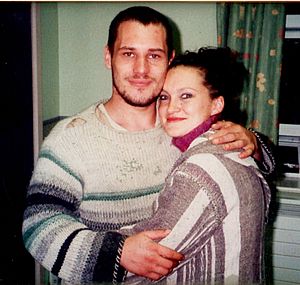by Tina Handrick
Introduction
There are a number of men and women in our prison systems today that are suffering from some form of severe mental illnesses and are not getting the proper treatment that they need to get
 |
| Prison Cell (Photo credit: danielkoehlersfotos) |
to the point where they can function as a normal citizen. It is even safe to say that our prison systems are now the new considered as the new mental health facilities, even though they are not designed or equipped to handle mentally ill inmates. The prisons systems are hard on the mentally challenged because of the overcrowding, violence, lack of privacy, lack of meaningful activities, isolation from family and friends, the uncertainty about life after prison, and the inadequate health services, and from untrained correctional officers that do not know how to deal with some of these issues. The impact of these issues rises as well when prisoners whose thinking and emotional responses are impaired by schizophrenia, bipolar disease, major depression, conduct disorder, antisocial disorder and other serious mental illnesses. As with all prisoners, mentally ill inmates have poor mental health services and that usually leaves them with medications that they either don’t need or with medication that does not work correctly (Fellner, nd).
 |
| Prison 2 (Photo credit: planetschwa) |
There are is a dangerous atmosphere at any correctional facility because of the security measured that need to be in place to keep everyone safe and the mental health considerations. There are rules and regulations that need to be followed, and codes of conduct in prisons that reflects staff concerns about security, safety, power, and control. Trying to coordinate all of those needs of the mentally ill with those rules and goals is nearly impossible (Fellner, nd). By trying different ways to deal with mentally ill inmates while in correctional setting can make it easier to deal with them, but it is crucial to properly train any personnel that are going to have any daily connection with them as well. That can make it a safer and a less stressful environment if a person knows what they are dealing with.
Mental Health
There is never a good time to be a prisoner in the United States, but incarceration is not meant to be fun and games. But a combination of strict sentencing guidelines, budget shortfalls and a punitive philosophy of corrections has made today's prisons much more unpleasant and much less likely to rehabilitate their inhabitants than in the past, many researchers say. So what is the role for psychologists? First and foremost, they are providing a mental health services to an ever expanding prison population, which has rates of mental illness at least three times the national average (Etienne, 2003). “More broadly, they are contributing a growing body of scientific evidence to political and philosophical discussions about the purpose of imprisonment,” says Craig Haney, PhD, a
 |
| English: Institute of Mental Health building in Belgrade. (Photo credit: Wikipedia) |
psychologist at the University of California, Santa Cruz. "Psychology as a discipline now has a tremendous amount of information about the origins of criminal behavior," says Haney. "I think that it is important for psychologists to bring that information to bear in the debate on what kind of crime control policies we, as a society, should follow."
Until the mid-1970s, rehabilitation was a key part of U.S. prison policy. Prisoners were encouraged to develop occupational skills and to resolve psychological problems such as substance abuse or aggression that might interfere with their reintegration into society. Indeed, many inmates received court sentences that mandated treatment for such problems. Since then, however, rehabilitation has taken a back seat to a "get tough on crime" approach that sees punishment as prison's main function, says Haney. The approach has created explosive growth in the prison population, while having at most a modest effect on crime rates (Etienne, 2003).
As a result of this the United States now has more than 2 million people in prisons or jails which is the equivalent of one in every 142 U.S. residents, and another four to five million people on probation or parole. There is a higher percentage of the population is involved in the criminal justice system in the United States than in any other developed country. Many of these inmates have serious mental illnesses. Starting in the late 1950s and 1960s, new psychotropic drugs and the community health movement dramatically reduced the number of people in state mental hospitals. But in the 1980s, many of the mentally ill who had left mental institutions in the previous two decades began entering the criminal justice system (Etienne, 2003).
 |
| English: The campaign 'The Incarceration of John' was created to highlight the inadequate and damaging response of chemicals and incarceration that John Hunt got to his emotional distress and psychosocial problems. It highlights the gap in the services and the human rights violations that people diagnosed with a mental health disorder experience. It challenges the concept of mental health disorder and psychiatric power. (Photo credit: Wikipedia) |
Today, somewhere between 15 and 20 percent of people in prison are mentally ill, according to U.S. Department of Justice estimates, and that is only an estimate that number is probably far from accurate. "Prisons have really become, in many ways, the de facto mental health hospitals," says former prison psychologist Thomas Fagan, PhD. "But prisons weren't built to deal with mentally ill people; they were built to deal with criminals doing time."
To help shift the focus from punishment to rehabilitation, psychologists are doing more research on the causes of crime and the psychological effects of incarceration. In the 1970s, when major changes were being made to the U.S. prison system, psychologists had little hard data to contribute, but in the past 25 years, says Haney, they have generated a massive literature documenting the importance of child abuse, poverty, early exposure to substance abuse and other risk factors for criminal behavior. The findings suggest that individual-centered approaches to crime prevention need to be complemented by community-based approaches (Etienne, 2003).
Researchers have also found that the pessimistic "nothing works" attitude toward rehabilitation that helped justify punitive prison policies in the 1970s was overstated. When properly implemented, work programs, education and psychotherapy can ease a prisoners' transitions to the free world, says Haney. Finally, researchers have demonstrated the power of the prison environment to shape behavior, often is the detriment of both prisoners and prison workers (Etienne, 2003). It’s really hard to get your thought process to change if you have others around you encouraging you to back against the system or commit some kind of infraction. The Stanford Prison Experiment, which Haney co-authored in 1973 with Stanford University psychologist and APA Past-president Philip
 |
| English: Huntsville Unit, Huntsville, TX Español: Unidad de Huntsville, Huntsville, TX (Photo credit: Wikipedia) |
G. Zimbardo, PhD, is one example. It showed that psychologically healthy individuals could become sadistic or depressed when placed in a prison-like environment.
More recently, Haney has been studying the so-called "supermax" prisons high-security units in which prisoners spend as many as 23 hours per day in solitary confinement for years at a time. Haney's research has shown that many prisoners in supermax units experience extremely high levels of anxiety and other negative emotions. When released often without any "decompression" period in lower-security facilities they have few of the social or occupational skills necessary to succeed in the outside world. Nonetheless, supermax facilities have become increasingly common over the past five to ten years. "This is what prison systems do under emergency circumstances they move to punitive social control mechanisms," explains Haney. "[But] it's a very short-term solution, and one that may do more long-term damage both to the system and to the individuals than it solves."
If these individuals are having any kind of mental issues and are being kept locked up for 23 hours a day then you can imagine that once they get released they really feel as if they are being freed and can go crazy, because for one they really never received treatment, they were just locked up and their issues we not dealt with.
 |
| Logo of the United States National Institute of Mental Health, part of the National Institutes of Health. (Photo credit: Wikipedia) |
When there are so many different mental disorders in the prison system, it is really important at this day and age to find out what exactly they are and how best to treat it, if it is by medication, counseling or both. Robert Hare (1993), one of the world’s leading experts on psychopathy, describes psychopaths as “social predators who charm, manipulate, and ruthlessly plow their way through life, leaving a broad trail of broken hearts, shattered expectations, and empty wallets. Completely lacking in conscience and empathy, they selfishly take what they want and do as they please, violating social norms and expectations without the slightest sense of guilt or regret”.
Schizophrenia is a mental disorder that people most people often associate with a “crazy behavior” especially since it frequently manifests itself in highly bizarre actions. It is still a mental disorder that continues to be extremely complex and poorly understood (Andreasen & Carpenter, 1993; Sitnikova, Goff, & Kuperberg, 2009). Schizophrenia generally begins early in life, and often leads to social and economic impairment, and leaves traces on its victims for the rest of their lives (Andreasen & Carpenter, 1993). Behavioral manifestations of schizophrenia are varied, but there are some common characteristics (Bartol & Bartol, 2011).
The disorders described in this section have a variety of names and diagnostic labels, su
 |
| English: Chicago-Read Mental Health Center sign (Photo credit: Wikipedia) |
ch as affective disorders, mood disorders, and bipolar depressive disorders. The most common label is major depressive disorder. The symptoms include an extremely depressed state that lasts for at least two weeks and is accompanied by a generalized slowing down of mental and physical activity, gloom, despair, feelings of worthlessness, and perhaps frequent thoughts of suicide. Everyone has up and down periods, but these mood changes are extreme and the depression is deep and usually long-lasting. Persons with major depression describe themselves as down, discouraged, and hopeless. A less common form of depression is bipolar depression in which there are both periods of depression and periods of excessive euphoria called mania (Bartol & Bartol, 2011).
The DSM-III and the DSM-III-R criteria for the antisocial personality disorder (APD) have been among the most frequently criticized because of their vagueness and lack of empirical anchoring (Widiger et al., 1991). The DSM-IV and DSM-IV-TR, however, have tried to address these problems by incorporating into the criteria more empirically based attributes. As mentioned in Chapter 6, many of the new criteria closely follow the Robert Hare definition of the criminal psychopath. The essential feature of a person with an APD is a history of continuous behavior in which the rights of others are violated. The individual must be at least 18 years of age and must have a history of some symptoms of conduct disorder before age 15. Recall that a diagnosis of conduct disorder is reserved for children and adolescents. Before a person can be diagnosed with APD, a pervasive pattern of disregard for and the violation of the rights of others must be indicated by at least three of the following behavioral patterns:
1. Failure to conform to social norms or the criminal law, as reflected by frequent performance of acts that are grounds for arrests
2. Irritability and unusual aggressiveness, as indicated by repeated physical fights or assaults
3. Consistent irresponsibility, as reflected in a poor work history or failure to honor financial obligations
4. Impulsivity or a failure to plan ahead (characteristic at all ages)
5. Deceitfulness, as reflected in frequent lying, use of aliases, or conning others for personal profit or pleasure
6. Reckless disregard for the safety of others or self
7. Lack of remorse or guilt for wrongdoings, as indicated by indifference to or rationalization of having hurt, mistreated, or stolen from another Additional symptoms, as outlined in the DSM-IV, include stealing, fighting, truancy, and resisting authority—typical childhood symptoms. Antisocial personalities lack empathy and tend to be callous, cynical, and contemptuous of the feelings, rights, and sufferings of others.
Furthermore, they frequently exhibit precocious and aggressive sexual behavior, excessive drinking, and the use of illicit drugs. There is a markedly impaired capacity to maintain lasting, close, warm, and responsible relationships with family, friends, or sexual partners (Bartol & Bartol, 2011).
Conclusion
 |
| Prison doors (Photo credit: rytc) |
More and more research is proving that behavior is learned from their parents and their environments and that as long as they are allowed to keep up with their present behaviors then they are more than likely to be in the prison systems when they are adults. Yes there are real disorders out there that some of these children do have and with the right combination of treatment hopefully they can lead productive lives, but our biggest issues in the United States are that kids are having kids, and they have no idea how to be a parent and they usually allow their children to do whatever they want because they are usually too busy out doing their own thing. Parents need to become more involved in their children’s lives so that if they do see that their children are showing any signs of any mental disorders they can get them the help that they need before their children get involved with the criminal activity.
References:
Fellner, J. (N.d). A corrections Quandary: Mental illness and prison rules. Retrieved from Harvard University: http://www.law.harvard.edu/students/orgs/crcl/vol41_2/fellner.pdf
Bartol, C. & Bartol, A. (2011). Criminal Behavior: A Psychological Approach (9th ed.). Upper Saddle River, NJ: Prentice Hall.
Chapter 5 Human Aggression and Violence: http://docsharing.next.ecollege.com/(NEXT(b5b0756b9b))/Main/CourseMode/DocSharing/ListCategoriesAndFilesView.ed#
Chapter 8 Crime and Mental Disorders: http://docsharing.next.ecollege.com/(NEXT(b5b0756b9b))/Main/CourseMode/DocSharing/ListCategoriesAndFilesView.ed#
Benson, E. (2003, July). Rehabilitate or punish? Retrieved from American Psychological Association: http://www.apa.org/monitor/julaug03/rehab.aspx


















0 comments:
Post a Comment